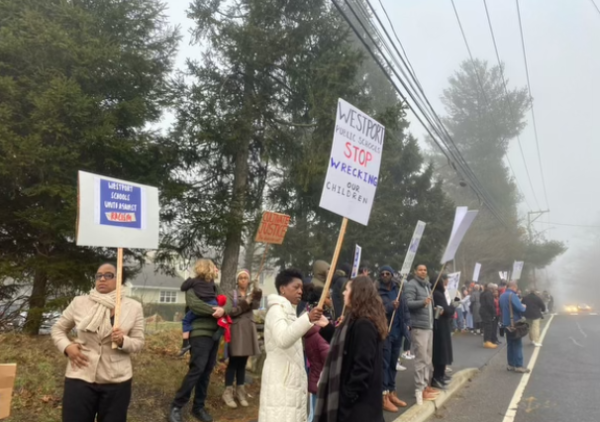Supreme Court decides fate of gay marriage
Obergefell v. Hodges, a collection of same-sex marriage cases currently being debated before the Supreme Court, is the culmination of years of hard work in the struggle for LGBTQ rights. Susan Sommer, co-counsel in one of the cases being considered, has spent what she calls the majority of her professional career participating in this effort. Her niece, Sarah Sommer, attends Staples.
Sommer, senior counsel and director of constitutional litigation at Lambda Legal, was inspired to fight for social justice after an interaction she had with a family at a party almost two decades ago.
She congratulated the parents of identical twin boys, one playing with dolls and one with toy weapons, on raising such unique children.
“They said they were concerned that the doll-playing boy might grow up to be gay and that life would be hard for him because of the discrimination he might face, so they were taking him to a specialist to try to change him,” Sommer said. “It hit me that the problem was not with the child but with the world around him. I could use my law degree to help change the world for children like him.”
king to protect people from discrimination ever since, including notable Supreme Court cases such as Lawrence v. Texas in 2003, which struck down sodomy laws. However, she says that Obergefell v. Hodges, for which she is in charge of writing briefs, is especially important.
“Before now, we have been addressing lower courts that are constrained by existing Supreme Court precedent,” Sommer explained. “Finally, we’re in the court that can change or elaborate on the precedent. Working on these briefs has been an opportunity to pour into a written presentation what we believe the Constitution truly requires, and to appeal to the court’s sense of the humanity and dignity of same-sex couples and their families.”
Sommer and her co-workers are appealing to the court through amicus (friend of the court) briefs, 60 of which have already been filed from “persuasive” voices, such as the American Psychological Association and top members of Congress. According to Sommer, these briefs are more important than even the oral argument when it comes down to deciding the case.
“The court is considering two questions: whether a state, under the Constitution, must license same-sex marriages within the state; and even if they don’t, whether they must still recognize same-sex marriages that have been performed in other states,” Sommer said. “If we would win, it should mean that same sex couples will have the freedom to marry anywhere in the country, and their validity won’t flicker on and off as they cross state lines.”
The court’s decision, expected by mid-June, will determine the fate of same-sex couples and their families across the country.
If Sommer’s side “wins” only the second question and not the first, it will still be considered a partial victory, because it would enable same-sex couples to travel elsewhere to get married and then return to their original state, where their marriage would be recognized.
“This case is the culmination of decades of work to legitimize gay people in this country and to remove the stigma that treated them as unworthy of something so basic and meaningful as being married,” Sommer said. “I firmly believe not only us but our clients are doing this not just for themselves but for the next generation, because we don’t want there to be a single person who must face a future in which they don’t think they have the same opportunities as anyone else.”
Sommer believes there has been a significant shift in public opinion during her 15-year career, and the movement of LGBTQ support is growing with the next generation — the people who this case will impact the most, even if they don’t understand it now.
“My youngest client is the two-year-old son of one of the couples involved in the Ohio case, and he is an adorable little tot with two wonderful fathers. After the Supreme Court argument, we walked down the steps of the Supreme Court and saw the big crowd of both supporters and foes, and at the bottom was this two-year-old boy clapping his hands,” Sommer recalled. “He was the cutest thing and the reminder of why this matters. This is about real families, real children and their future.”

Since the time that she could remember, Rachel Treisman ’15 always loved reading and writing. And with a long list of titles read, she kept track of...




















































